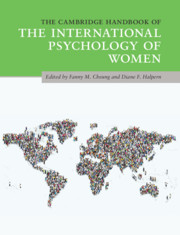Book contents
- The Cambridge Handbook of the International Psychology of Women
- The Cambridge Handbook of the International Psychology of Women
- Copyright page
- Dedication
- Contents
- Figures
- Tables
- Contributors
- Acknowledgments
- Section 1 The Underpinnings of Sex and Gender and How to Study Them
- Section 2 Developmental Perspectives of the International Psychology of Women
- Section 3 Cognitive and Social Factors
- Section 4 Work and Family Issues
- Section 5 Inequality and Social Justice
- Section 6 Health and Well-Being
- 31 Happiness across Cultures and Genders
- 32 Women under Pressure
- 33 Gender and Women’s Sexual and Reproductive Health
- 34 Physical Health
- 35 Women and Suicidal Behavior
- 36 Sex and Gender in Psychopathology
- 37 Women and Psychotherapy
- Epilogue Some Final Thoughts and Take-Home Messages
- Index
- References
36 - Sex and Gender in Psychopathology
from Section 6 - Health and Well-Being
Published online by Cambridge University Press: 20 July 2020
- The Cambridge Handbook of the International Psychology of Women
- The Cambridge Handbook of the International Psychology of Women
- Copyright page
- Dedication
- Contents
- Figures
- Tables
- Contributors
- Acknowledgments
- Section 1 The Underpinnings of Sex and Gender and How to Study Them
- Section 2 Developmental Perspectives of the International Psychology of Women
- Section 3 Cognitive and Social Factors
- Section 4 Work and Family Issues
- Section 5 Inequality and Social Justice
- Section 6 Health and Well-Being
- 31 Happiness across Cultures and Genders
- 32 Women under Pressure
- 33 Gender and Women’s Sexual and Reproductive Health
- 34 Physical Health
- 35 Women and Suicidal Behavior
- 36 Sex and Gender in Psychopathology
- 37 Women and Psychotherapy
- Epilogue Some Final Thoughts and Take-Home Messages
- Index
- References
Summary
It is important to understand the differential impact of individual difference characteristics on psychopathology. Sex and gender constructs are individual difference variables that are crucial in fully understanding mental illnesses. In this chapter, we consider international perspectives on sex and gender in psychopathology. Unfortunately, our knowledge of sex and gender in psychopathology is limited by several factors, including conflated terminology, sex- and gender-neutral research, and various biases; all of which are discussed herein. Furthermore, our knowledge related to the intersection of nationality and sex and gender on psychopathology is limited. Nonetheless, we discuss what is known and what remains unknown about sex and gender in five major psychopathology categories: Autism Spectrum Disorder, ADHD, Eating Disorders, Major Depressive Disorder, and Substance Use Disorders.
Keywords
- Type
- Chapter
- Information
- The Cambridge Handbook of the International Psychology of Women , pp. 514 - 525Publisher: Cambridge University PressPrint publication year: 2020
References
Suggested Readings

Elizabeth K. Lefler has been an Associate Professor of Psychology at the University of Northern Iowa in Cedar Falls, since 2015. She was born in Nebraska where she earned her BA in Psychology from the University of Nebraska in Lincoln, and her MA and PhD in Clinical Psychology from Oklahoma State University in Stillwater. Lefler completed a pre-doctoral internship at the Kennedy Krieger Institute, Johns Hopkins School of Medicine in Baltimore, Maryland, and a postdoctoral fellowship at the Children’s Hospital of Philadelphia. Lefler’s research interests include the assessment of Attention-Deficit/Hyperactivity Disorder (ADHD) in understudied populations, as well as sex/gender differences in psychopathology. Lefler is the Director of the Psychological Assessment Clinic at the University of Northern Iowa, was honored to be a Fulbright Scholar in Kraków, Poland in 2017, where she taught child psychopathology courses to Polish university students at Uniwersytet Jagiellonski in Kraków.

Cynthia M. Hartung is a Professor of Psychology at the University of Wyoming in Laramie. She was born in Chicago, Illinois and attended college in Wisconsin. She earned her PhD in Clinical Psychology from the University of Kentucky in Lexington, and subsequently completed her internship at the University of Chicago Medical Center. Hartung then completed postdoctoral fellowships at the Oregon Health Sciences University in Portland and at the University of Denver in Colorado. Prior to beginning her position at the University of Wyoming in 2007, she was an Assistant Professor of Psychology at Oklahoma State University. Hartung is also an Adjunct Professor in Gender and Women’s Studies as well as the director of the University of Wyoming Psychology Clinic. Hartung’s research interests include sex and gender differences in psychopathology and the assessment and treatment of ADHD in adolescents and emerging adults with a focus on healthy lifestyle interventions. She is the author or co-author of more than 40 publications on these topics and has made numerous presentations regionally, nationally, and internationally.

